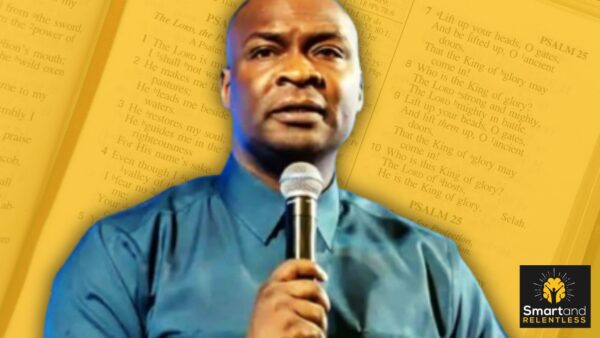Be Smart and Relentless!
Subscribe to receive updates on the latest faith-based success tips, cutting-edge entrepreneurial concepts, and exciting opportunities.
In this article, I will share a season in my adult life that was my most unproductive, where I felt like I was going nowhere. This period of peak laziness began around 13 years ago, when I joined a Pentecostal church early in my Christian journey. During this time, I can honestly say I was at my laziest, since I allowed the church, I attended to mold me into having a passive attitude towards life. This is the reason for this article, “How My Church Made Me Lazy.” I will explain exactly how this happened and how I overcame it to become an impactful believer in Christ.
Just to make it clear, my intention is not to diminish the importance of the church, which is vital in the body of Christ. Instead, I aim to help someone avoid the mistake I made due to a lack of knowledge of the Word. I didn’t study the Bible myself but blindly followed the words of my pastor, who became like a god to me. As a Christian, I strongly believe that being part of a community of like-minded individuals in faith is essential for every believer. However, that does not negate the fact that we must be intentional about the people we align ourselves with, especially within the faith. After all, as Proverbs 27:17 says, “iron sharpens iron.” It’s crucial to join a community that aligns with God’s purpose for you. For example, if you are called into leadership, a church that emphasizes leadership might be ideal. If you’re called to be a full-time missionary, a church focused on evangelism may be a better fit. Similarly, if you are passionate about prayer, a church that holds regular prayer vigils might be more suitable for you. For me, my sphere of influence is business, but my experience in that church was challenging because the sermons preached seemed anti-entrepreneurship. The messages made me second-guess myself, leaving me confused and stagnant. As a new believer, I began to form the belief that running a business was a sin, even if it was run ethically. In hindsight, this seems illogical, but at the time, it felt true.
I know of a church ministry in London comprised of actors and actresses who share vital values: the Christian faith and their call from God to be a beacon of light within the film industry. This church is successful because their results are measurable in impact. Not only do they congregate once a month to read the Bible and share their experiences within the media industry as kingdom ambassadors, but they also encourage one another. This is the definition of “iron sharpening iron.”
Now let me return to my story about why my church made me lazy many years ago and how I was eventually delivered from it.
Thirteen years ago, I joined a church as a relatively new believer. Looking back, I realize that it wasn’t the right fit for me. I was part of that church for about three years, during which my work ethic diminished. Before joining the church, I had a strong work ethic; I could easily work 18 hours a day on my business because that’s how I was wired—a go-all-out mentality. However, after my conversion, things changed.
At this church, the message was constantly centered around a fear of God, almost as if He were a harsh judge waiting to condemn us. I was taught that being an effective Christian meant serving within the church—whether by singing in the choir, being an usher, or teaching Sunday school. The biggest factor in determining whether someone was a true Christian was their physical attendance; those who did not attend in person daily were seen as lukewarm Christians.
In reality, there was no sense of balance between faith and work, and more crucially, there was little effort to empower congregants to use their gifts to advance the Kingdom.
Thinking back, I wish I had taken the time to study the Bible for myself instead of blindly listening to every word of the pastor. I take full responsibility for that, but I am also grateful for the many ways the church helped me. For now, I am focusing on understanding why, at that period of my life, my church made me stagnant.
Reevaluating that stage, I realize I was a performance-based Christian, believing that God was always watching and waiting to punish me for every misstep. This mindset was unhealthy and mentally exhausting, preventing me from focusing on my assignment and calling in business. The legalistic preaching, which emphasized perfect behaviour rather than the Gospel, led me to focus solely on my actions. As a self-employed person, I needed encouragement rooted in God’s word and Biblical principles such as boldness, diligence, perseverance, and planning.
As I mentioned before, prior to attending this church, I was confident, hardworking, bold, and resilient. However, after joining, my qualities of diligence, discipline, and perseverance—values that are all Biblical—drastically declined. As my work ethic declined, so did my bank balance. My minimal work ethic matched my financial net worth, which led to growing frustration.
So, how did my church make me lazy? There were many reasons. First, being in that church led me to a conflicted mindset. I became double-minded; deep down, I knew that working was not evil, but the message from the pulpit suggested that working hard outside of church was somehow sinful or that setting goals was not within God’s will.
This messaging is why many believers today fail to reach their potential. The pastor repeatedly told the congregation things like, “Wait on God for every single decision,” which led me to delay actions that God had already given me the power and responsibility to take. Messages like this only program believers to procrastinate. Instead of being decisive and taking action, I was waiting for a sign from God, which proved impractical. I should have followed God’s principles in the Bible, such as Ecclesiastes 9:10: “Whatever your hand finds to do, do it with all your might.”
The members of the church were also told by the pastor that only through his special anointing could we find a breakthrough. Essentially, the power of Jesus was not considered sufficient; there had to be something extra, like an anointing oil, blessed by the pastor.
Another message frequently preached was, “God will do it.” This made me believe that, as a Christian, I no longer needed to work; I could just sit back and let God handle everything, leading me to avoid personal responsibility for my life and success. The church also emphasized, “Jesus is coming; do not miss the rapture,” linking it to the notion that only regular church attendance would save us. This psychology played on my mind, making me question the point of making plans or working hard when I could just be in the church building, waiting.
I could go on and on to illustrate my point, such as how the congregants were led to believe that if we tithed, we could be assured of a financial breakthrough. Why work hard when I could give tithes and expect money to flow to me?
My turning point came when the church announced another 28-day prayer program, requiring mandatory daily attendance. At this point, my life was completely consumed by the church. During these 28 days, I decided to join a gym. While walking to the gym, I contemplated leaving the faith altogether because it felt like bondage; I felt trapped and purposeless.
While on the treadmill, I experienced serious chest pains, which grew more intense, so I left the gym. As I was leaving, I heard beautiful gospel hymns coming from a cathedral. Still in my gym clothes, I felt led to enter. Inside, the preacher asked everyone to form small prayer groups. The person holding my left hand, a guitarist in the choir. He said, “You’ve been having chest pains; they are now gone.” As he spoke, the pain vanished. He also addressed my inner dialogue, saying, “It’s not by your good works that you receive salvation.” This lifted a weight from my shoulders and changed my heart. I felt relieved and empowered.
It was then that I decided to leave my old church, study the Bible for myself, and seek teachings from pastors who encouraged being an impactful Christian by living out one’s purpose. I joined a new church that aligned with the Word of God and was filled with like-minded individuals who shared a similar calling in Kingdom business. During this time, I regained my work ethic, focus, and confidence, which I directed towards the marketplace in a godly way. Since then, my productivity has increased tenfold. This journey also inspired me to write the book ‘Successful Christians.’ I hope this story encourages you not just to be a Christian but to be a productive one.

Author

Recent Posts
Related Articles
Do your very best and let God do the rest
This morning, I read a scripture in the Bible that I believe...
ByDeji OkNovember 28, 2024Why are muslims more successful than Christians?
In recent years, there has been a noticeable trend of influential individuals...
ByDeji OkNovember 26, 2024Successful Christians the book – Available Now!
Grab your copy of Successful Christians the book.
ByAdminNovember 19, 2024The real reason why every Christian needs to be rich and successful
In today’s society, I believe Christians should seek financial freedom and influence...
ByAdmin, Deji OkNovember 18, 2024












